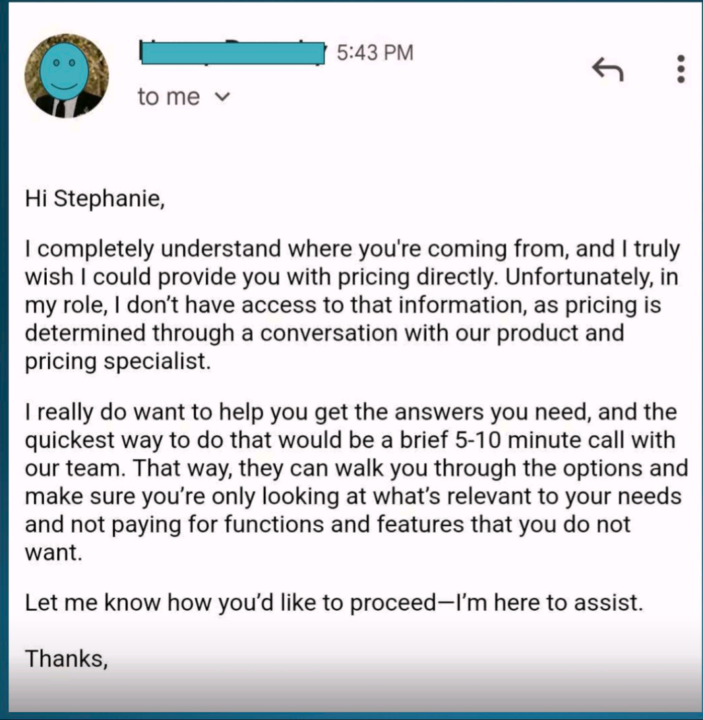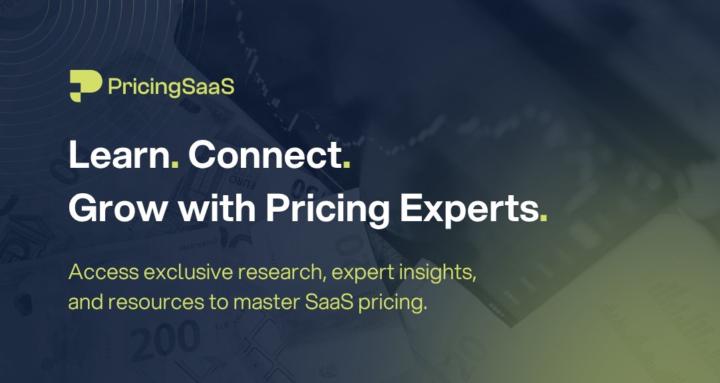
Write something
SaaS pricing vs timeshare seminar
https://www.linkedin.com/posts/marcussheridan_this-is-so-ridiculous-a-team-member-of-activity-7302699723885326336-97g4?utm_source=social_share_send&utm_medium=android_app&rcm=ACoAADipAOoBbvkfKaUA3ujNjcEfIDfPaLZR4iw&utm_campaign=copy_link A while back I read an an example about responding to the question "how much does a truck cost?" Sales rep can either ask a dozen follow up questions and give a tighter range as the first numeric response or say a broad range and then use the questions to find out what the customer values. "We have models from $18k - $125k that are designed for different needs such as towing, cargo capacity, luxury interiors and even fitting multiple children carseats. Let's talk about how you plan to use your truck" Buying a timeshare vacation property is a notoriously shrouded process where people are intoced by a few nights free stay, a fancy meal or some other perk to sit through a sales presentation. Even this seems better than a lot of b2b SaaS companies who want to email SPAM you and set time killer meetings instead of just publishing their pricing and packaging.

How to aproach larger companies that will only work with you if you sell them the platform
Thanks for accepting me in your community. I have spent two months reading The Pricing Roadmap book and watching Ulrik´s videos to improve my company aproach on pricing. We have a lot to work and learn and is super exciting to carry on this project. I have, however a much pressing question. We provide a monitoring and control saas service for mining, water utilities and energy companies and we also install and mantain our monitoring instruments. We deal with much bigger than us, cupper mining companies and pulp companies, among others. They frequently pick their suppliers on biddings and lately some of the biddings require we sell the platform to them because they want complete control on their data. Related to this, some big energy intensive companys have told us, no, we cannot work with you because all our data must remain within the house for security resons. So, I was thinking.. A "job to be done" would be ...I want others to develop my platform but I want to run it withouth the data going out. If we develop, and deliver an entire platform for each of this requests. How are we suposse to charge? and more important.. should we do it? Could we answer in other way with out losing this opportunities? If you could guide me in this, I would really aprecciate it. Kind Regards and excuse grammar english mistakes.
Implementing complex pricing structure
Hi guys, I read Ulrich's book as I have an enterprise focused collaboration solution (AI) being developed. I think it makes sense for us to price for usage, infra and some services. I have a good contract lawyer who can draft pretty much any legal agreement but a question lingers: how do you guys do it operationally? (what tech stack do you use from "quote to cash" to implement complex pricing structure? Any stack that would scale from startup to more mature state?). On a separate but related topic : what license server/engine would you recommend for an AWS BYOL approach? Thank you!
SaaS Contract Framework for Price Increases
Hey folks. I'm currently working on optimizing price increases which has me re-evaluating how we've structured our commercial agreements. Right now most of our customers sign a one year contract term then ~3 months before the term ends our reps start their outreach to engage in renewal conversations asking for another one year contract. Also, most of our contracts have price increase language that states we'll increase their price at the greater of CPI or 5% at renewal. We have a lot of these agreements setup to auto renew, but even if that's in place we try to get customers to agree to the renewal terms so there are no surprises when they get the invoice. We have 4K+ customers so there's a lot of energy going into just renewing existing customers. This has got me thinking about trying to propose moving to agreements that are more "evergreen" and require less renewal effort. @Ulrik Lehrskov-Schmidt's book has a Contract Framework that paraphrases a cancellation clause as "Customer is a customer of SaaS business until Customer chooses to cancel this contract as per cancellation terms." I'm curious how this works in practice. I guess we could still have customers commit to an initial one year term then after one year just have it say in the contract that they (or we) can cancel with 30 days notice. That would solve the problem of the labor intensive renewal discussions. What I'm not sure how to solve for is payments. We would still want to have most customers pay annually so if they paid for 12 months then canceled effective end of month 3, we'd have to refund them 9 months of the payment. Additionally, I want to get rid of 5% or CPI price increase language and just have the contract state that we can increase price with 30 days notice. This gives us a lot more flexibility with executing price increases as right now we're pretty much stuck with only being able to increase price at renewal. I'm curious if any of you have experience with best practices here. Is there a way to get out of these painful renewal motions without moving to a monthly subscription? Even just understanding the most common B2B SaaS Contract Frameworks as it relates to renewing customers would be really helpful.
Usage metering tools
Hi pricing community, I’m looking to hear about anyone’s experience using third party tools to help implement usage metering. If you’ve done this, would you mind sharing a bit about your experience (i.e. which tool, problem it solved, duration of implementation, pros/cons, etc.). Thank you in advance!
1-7 of 7

skool.com/pricingsaas
The first stop for SaaS pricing and packaging.
Powered by









